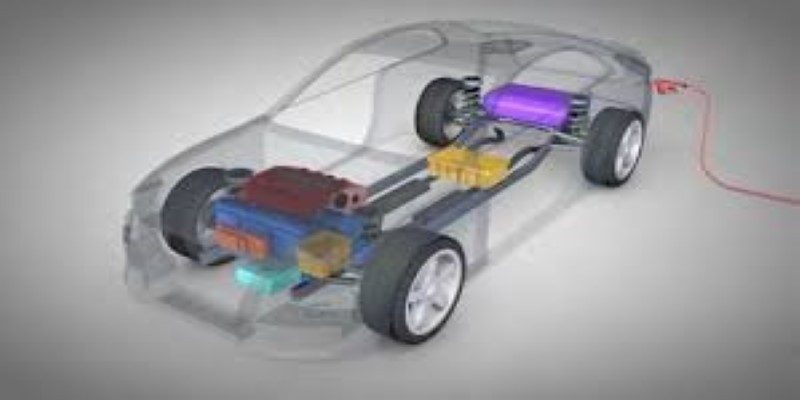
About Course
A systems course to understand the fundamentals of Electric Vehicles (EVs). The course will examine technology associated with each element of EV drive-train; at the same time, it will get into the economics of EVs vis-à-vis petrol vehicles.
COURSE LAYOUT
The key topics that are going to be discussed in this course areElectric Vehicles
1. Overview of EV/
2. Vehicle Dynamics
3. Vehicle Subsystems: EV Power-train
3.1 Storage for EVs
3.2 Fundamentals of EV Battery Pack design
3.3 EV Motors and Controllers: Fundamentals and Design
4 Vehicle Accessories
5 Battery Charging and Swapping
6. Management of EV Infrastructure
Course Content
Fundamentals of Electric Vehicles: Technology & Economics
-
Lecture 76- Course Summary
00:00 -
Lecture 56 – Field-oriented Control
00:00 -
Lecture 55 – The d-q Equivalent circuit – Part 2
00:00 -
Lecture 54 – The d-q Equivalent circuit – Part 1
00:00 -
Lecture 53 – Speed and Back EMF
00:00 -
Lecture 52 – Torque Production – Part 3
00:00 -
Lecture 51 – Torque Production – Part 2
00:00 -
Lecture 50 – Torque Production – Part 1
00:00 -
Lecture 49 – Power and Efficiency
00:00 -
Lecture 48 – EV Motors and Controllers – Understanding Flow – Part 2
00:00 -
Lecture 47 – EV Motors and Controllers – Understanding Flow – Part 1
00:00 -
Lecture 46 – BMS Design of Electric Vehicle – Part 3
00:00 -
Lecture 45 – BMS Design of Electric Vehicle – Part 2
00:00 -
Lecture 44 – BMS Design of Electric Vehicle – Part 1
00:00 -
Lecture 43 – Electrical Design – Part 3
00:00 -
Lecture 42 – Electrical Design – Part 2
00:00 -
Lecture 41 – Electrical Design – Part 1
00:00 -
Lecture 40 – Thermal Design – Part 4
00:00 -
Lecture 57 – Three phase AC – Part 1
00:00 -
Lecture 58 – Three phase AC – Part 2
00:00 -
Lecture 75 – Analytics – Part 2
00:00 -
Lecture 74 – Analytics – Part 1
00:00 -
Lecture 73 – Economics of Public Chargers in context
00:00 -
Lecture 72 – Bulk Chargers/Swap Stations – Part 2
00:00 -
Lecture 71 – Bulk Chargers/Swap Stations – Part 1
00:00 -
Lecture 70 – Public Chargers – Part 2
00:00 -
Lecture 69 – Public Chargers – Part 1
00:00 -
Lecture 68 – Standardization and On board Chargers
00:00 -
Lecture 67 – Battery Swapping
00:00 -
Lecture 66 – EV Chargers: Slow or Fast – Part 2
00:00 -
Lecture 65 – EV Chargers: Slow or Fast – Part 1
00:00 -
Lecture 64 – EV Chargers: Introduction
00:00 -
Lecture 63 – Future Frontiers
00:00 -
Lecture 62 – Engineering Considerations – Part 2
00:00 -
Lecture 61 – Engineering Considerations – Part 1
00:00 -
Lecture 60 – Thermal Design – Part 2
00:00 -
Lecture 59 – Thermal Design – Part 1
00:00 -
Lecture 39 – Thermal Design – Part 3
00:00 -
Lecture 38 – Thermal Design – Part 2
00:00 -
Lecture 37 – Thermal Design – Part 1
00:00 -
Lecture 17 – EV Subsystem: Design of EV Drive Train – Part 1
00:00 -
Lecture 16 – Drive Cycles and Energy used per km – Part 2
00:00 -
Lecture 15 – Drive Cycles and Energy used per km – Part 1
00:00 -
Lecture 14 – Concept of Drive Cycle – 2
00:00 -
Lecture 13 – Concept of Drive Cycle – 1
00:00 -
Lecture 12 – Putting it all together – 2
00:00 -
Lecture 11 – Putting it all together – 1
00:00 -
Lecture 10 – Power and Torque to accelerate
00:00 -
Lecture 9 – Aerodynamic drag, Rolling Resistance and Uphill Resistance
00:00 -
Lecture 8 – Forces acting when a vehicle move
00:00 -
Lecture 7: EV Subsystems
00:00 -
Lecture 6: Where will we get Lithium for batteries?
00:00 -
Lecture 5: Charging and SwappingInfrastructure
00:00 -
Lecture 4 – A bit about batteries
00:00 -
Lecture 3 – EV program Innovatively and Differently and scale? – Part 2
00:00 -
Lecture 2: EV program Innovatively and Differently and scale? – Part 1
00:00 -
Lecture 1: Overview of Electric Vehicles
00:00 -
Lecture 18 – EV Subsystem: Design of EV Drive Train – Part 2
00:00 -
Lecture 19 – Introduction to Battery Parameters – Part 1
00:00 -
Lecture 36 – Mechanical Design – Part 4
00:00 -
Lecture 35 – Mechanical Design – Part 3
00:00 -
Lecture 34 – Mechanical Design – Part 2
00:00 -
Lecture 33 – Mechanical Design – Part 1
00:00 -
Lecture 32 – Fundamentals of Battery Pack Design
00:00 -
Lecture 31 – Charging Batteries
00:00 -
Lecture 30 – Computation of Effective cost of battery – Part 2
00:00 -
Lecture 29 – Computation of Effective cost of battery – Part 1
00:00 -
Lecture 28 – Battery Pack Development – Part 2
00:00 -
Lecture 27 – Battery Pack Development – Part 1
21:24 -
Lecture 26 – SoH and SoC estimation and Self Discharge – Part 2
00:00 -
Lecture 25 – SoH and SoC estimation and Self Discharge – Part 1
00:00 -
Lecture 24 – Li-Ion Battery Cells
00:00 -
Lecture 23 – Batteries in Future
00:00 -
Lecture 22 – Why Lithium Ion Battery? – Part 2
00:00 -
Lecture 21 – Why Lithium Ion Battery? – Part 1
00:00 -
Lecture 20 – Introduction to Battery Parameters – Part 2
00:00 -
Introduction to the Course
00:00
Student Ratings & Reviews

No Review Yet
